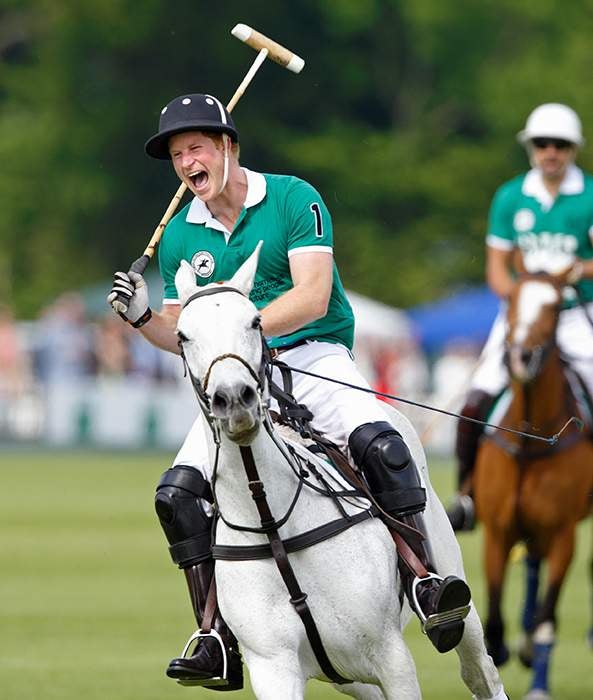
Beyond the obvious ‘moreishness’ of polo lies a certain madness among its HNW patrons, writes Sam Leith
Polo. You’ve sniffed the cologne. You’ve read the fruity Jilly Cooper book. You’ve worn the shirt. You’ve sucked the mint. But the real thing? Many are called but few are chosen. And the reason is that it costs the sort of money usually denoted on social media by the integrated glyph £££. Or £££££££, to be precise. Thing is, the other weekend I was sent on assignment by this organ’s downmarket rival Tatler to have a go at learning horsey golf at a lovely Spanish resort called Polo Valley whose specialism is as its name suggests. And, friends, I bloody loved it.
I have two essential takeaways – or, as floppy liberals sometimes call them, learnings – from my experience. One is that you can finally see the point of sitting on a horse if you have a weird croquet mallet to wield and a ball to hit. The other is that polo-playing HNWs are quite, quite mad.
Now, it’s not quite the experience of playing the game that I mean to harp on here. I get that. There is an amazing golf-like moreishness to the experience of timing a shot right and seeing the ball chug sweetly away into the near distance. There is a definite thrill to the complex, multifaceted mastery of a good player whose pony, thighs, arms, and eyes are working in perfect concert, with whom the polo stick is a graceful and easeful extension of the motion of the arm, and whose stick-head’s contact with the ball rings like a bell. I’ve watched the videos and I’ve marvelled at Adolfo Cambiaso, the best player
of all time, and his positively supernatural horsemanship and hand-eye co-ordination.
No, no, I get all that. It’s the madness thing I want to talk about. Because, coming to it cold, and talking to my hosts – polo nuts, as you’d expect – I realised that the structure of this sport is set up like no other. It doesn’t have a business model; or, at least, the business model is simply to take unimaginable sums of money out of the pockets of people who love and want to play polo, and have hedge funds or kleptocracies and suchlike, and to funnel it directly into the pockets of people who are good at playing it. And that is it.
I mean, look: most sports have a sort of market model. That model tends to depend on a) lots of fans willing to pay to watch the thing in person or on TV or both, and/or
b) great pots of prize money or sponsorship money that helps to pay the professional players and gives the owners of football teams or racehorses or whatever it is the possibility of defraying their costs and, maybe, turning a profit. That makes sense. Say you’re a random Russian oligarch. You love football. Perhaps you’re keen not to be bumped off or thrown in jail by Vladimir Putin. So you buy an English football team. It’s an investment and it’s a hobby and it’s a way of making sure someone will notice if you vanish unexpectedly.
But being a polo patron is a whole different kettle of sturgeon. You play, if you’re pretty good, off a handicap of one or two (they run from minus two to ten, for no reason I can discern – and anyone above two is pretty good; ten is phenomenal); and essentially you are paying footballer salaries so as to play on the same team as people stratospherically better than you. Plus, of course, you’re paying for grooms, stabling, trainers, top-rank horseflesh in serious quantities (ponies are swapped in every couple of minutes
in a high-goal game), and all the rest. And for what? Just for the lolz.
There’s still no real spectator market for polo. I gather they televise it a bit in Argentina, whence all but one of the world’s ten-goalers hail, but nobody has quite figured out a way of filming it satisfactorily, what with the speed, the unpredictability, the expanse of the field: drone footage is the latest wheeze, but horses don’t like that and audiences will tend to get motion-sick. People show up to see it live a bit – but mostly for strawberries and Champagne and ogling Prince Harry and the chance to be sick, at the end of the day, in a really expensive hat. And as for prize money or serious sponsorship, dream on.
So patrons are doing it just for the love of being able to play – and, of course, being set up with a doozy of a shot at goal by a pro who could (if he chose) have made the goal directly from that position and probably knocked the balls off a mosquito en passant. So all that money pours into the game… just for love of the game. Which, to bring me back to point one, I totally get. When I win the lottery, I know which sport I’m taking up.
Sam Leith is the literary editor of The Spectator






